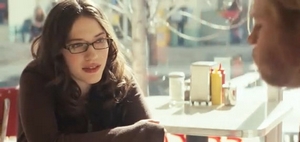Mark:
When a comic book to screen conversion features names like Natalie Portman, Anthony Hopkins and Kenneth Branagh among its credits, one might expect a degree of elevation of the material above the standard ‘comic book movie’ fare. Although a great leading turn by Aussie actor Chris Hemsworth does give it a lift, unfortunately Thor struggles to maintain its momentum.
When Thor (Hemsworth) leads his mates on an unauthorised attack on the home planet of the Frost Giants – mortal enemies of Odin and his kingdom of warriors and heroes – he is cast out of Asgard into exile on Earth. A chance meeting with an improbably sexy astrophysicist (Portman) will lead to an unlikely romance that could threaten the safety of Earth as machinations behind the scenes in Asgard will mean Thor faces unforeseen danger and we could be in the crossfire.
A chance meeting with an improbably sexy astrophysicist (Portman) will lead to an unlikely romance that could threaten the safety of Earth as machinations behind the scenes in Asgard will mean Thor faces unforeseen danger and we could be in the crossfire.
The most noteworthy feature of the steady stream of conversions from Marvel comic to screen is the degree of integration between films. Even though it is only small things – Captain America’s shield in the background, or brief clips post-credits – in each film that link them to one another, the effect is of making them feel integrated enough that the forthcoming film of The Avengers will likely have more chance of success. It doesn’t take much to reference another character or plot in the Marvel canon, but each time it provides another layer of enjoyment for fans of the comics, and, for comic book non-aficionados like myself, a greater sense of understanding of the world according to Marvel.
Although a certain cameo appearance in Thor has been well and truly leaked on the interwebs, the recent snafu featuring everyone’s favourite Australian film critic Jim Schembri makes this critic more wary of explicitly stating the who or why, but let’s just say that a brief appearance by another character from The Avengers occurs and it isn’t in the now-obligatory post-credit sequence featuring Samuel L. Jackson.
Hemsworth leads an impressive cast and does so with aplomb: he is charming and menacing and everything in between, but it is probably his ability to play comedic moments straight that is most endearing. Portman has a role of some significance, and, as always, manages it with skill and grace, although one could argue that her character could have been allowed a little more depth. Stellan Skarsgård and Anthony Hopkins are used really only in brief passages, while well-known actors like Idris Elba and Rene Russo appear in roles that seem beneath their abilities.
There are certainly aspects of the film that just don’t work, and this includes Thor’s companions Sif (Jaimie Alexander) and the Warriors Three, whose inclusion mostly seems to have been intended to provide comic relief, but this never quite works. The film feels overlong, although at only 114 minutes Branagh has shown admirable self-restraint: after all, he is the director of the 242-minute screen adaptation of Hamlet.
Lastly, the 3D post-conversion issue must again be raised, although I will admit up-front that I have tended to avoid seeing films in 3D when possible and find the mad rush to convert everything into 3D a bizarre and potentially disastrous fashion. Having no option but to see Thor in 3D, however, I can only say it adds next-to-nothing to the experience. It also might be that it makes the viewing of this film harder, as the close-quarters fight sequences are among the most difficult to watch I’ve experienced. Dark, indecipherable images of vague shapes moving rapidly around one another making grunting noises does not make for an exciting experience.
These quibbles aside, Thor is intended to be big, loud fun, and – for the most part – it is.
Rating:
 Asgard looks tremendous – kind of a cross between the worlds of Tron and Excalibur (and maybe a little bit of ‘Myst’) – and is the perfect balance between science and magic. The gods’ outfits are respectful to the comics without being too ridiculous, and a particular robot sentinel is everything that Gort wasn’t in
Asgard looks tremendous – kind of a cross between the worlds of Tron and Excalibur (and maybe a little bit of ‘Myst’) – and is the perfect balance between science and magic. The gods’ outfits are respectful to the comics without being too ridiculous, and a particular robot sentinel is everything that Gort wasn’t in